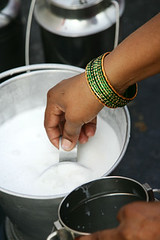A collaborative training course on microbial risk assessment in Vietnam has provided policymakers with scientific evidence for decision-making towards better management of health risks in food and water.
Environmental health risk assessment in general and microbial risk assessment in particular are still at a very early stage of development in Vietnam.
With its rapid urbanization, industrialization, agricultural development and population growth, Vietnam faces increasing risks from microbial hazards contaminating its water and food supply.
In early 2010, the Swiss-based National Centre of Competence in Research (NCCR) North-South piloted a project that developed a training curriculum in microbial risk assessment as part of national interventions aimed at better managing food- and water-borne health risks in Vietnam.
The project was led by the Hanoi School of Public Health in partnership with the National Institute of Nutrition, the National Institute of Hygiene and Epidemiology, the Preventive Medicine Centre of Ha Nam Province and the Swiss Tropical and Public Health Institute.
Experts from the Market Opportunities theme of the International Livestock Research Institute (ILRI) provided the team with technical support to ensure the quality of the curriculum which covers water, sanitation and food safety.
The collaborative process of developing the training course helped the concerned groups in Vietnam to work together, culminating, in January 2011, with a final training workshop attended by representatives from universities, research institutions and government ministries to discuss areas of future collaboration in research and capacity strengthening in risk assessment.
The course has led to the setting up of a local network on health risk assessment, enhanced the quality of training at the Hanoi School of Public Health, and developed a book-length manual of microbial risk assessment guidelines for food safety.
The development of the training course and its policy impact in tackling issues of water, sanitation, and food safety in Vietnam are described in these NCCR North-South Outcome Highlights, available in English and Vietnamese.
You may also be interested in:
Ecohealth approaches can improve food safety management in Vietnam



